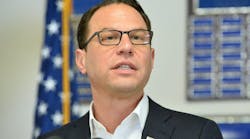Pennsylvania Gov. Shapiro to provide critical funding to help SEPTA avoid major fare increases and service cuts
The Southeastern Pennsylvania Transportation Authority (SEPTA) is facing a $240 million annual budget deficit with the exhaustion of federal COVID-19 pandemic relief funds. To prevent immediate service cuts and a planned 21 percent fare increase, Pennsylvania Gov. Josh Shapiro has directed Pennsylvania Department of Transportation (PennDOT) Secretary Mike Carroll to begin the process of transferring $153 million in federal highway capital funds to SEPTA, which will allow the agency to maintain critical operations through at least July 2025.
The transferring of capital funds will not jeopardize or halt any ongoing infrastructure projects already underway across the commonwealth, as the projects are not yet under construction or have been put out to bid.
“As governor, I have a responsibility to serve every region of our commonwealth — rural, suburban and urban,” Gov. Shapiro said. “Over the past two years, we’ve come together on a bipartisan basis to invest $330.5 million in additional funding for Pennsylvania’s roads and bridges, repairing more poor-condition bridges than any other state and improving more miles of roadway than at any time in the past decade but while we’ve made great progress on our roadways, we must also address the needs of mass transit riders, particularly those in Southeastern Pennsylvania, who rely on SEPTA every day to get to work, school, medical appointments and more.”
Earlier this year, Gov. Shapiro’s 2024-205 budget proposal included $1.5 billion in new statewide mass transit funding during the next five years, including $282.8 million in recurring annual revenue.
The governor has also secured commitments from the five counties that fund SEPTA to increase their local share, delivering millions in additional funding for the transit agency, which will allow SEPTA to maintain current operations, continue investments in safety and cleanliness and prepare for high-profile events in the coming years, including America’s 250th anniversary, the FIFA World Cup and the MLB All-Star Game in 2026.
Fare increases
While Gov. Shapiro’s actions will prevent a planned 21 percent fare increase, the SEPTA Board approved a 7.5 percent fare increase that will go into effect on Dec. 1. The Travel Wallet fare on buses, subways and trolleys will be $2.50, which is the same as the cash fare. Most single-trip fares on Regional Rail will increase to align Travel Wallet and Quick Trip pricing.
“For two years, we have been warning about the dire consequences facing SEPTA – and our region – due to the looming fiscal cliff,” said SEPTA Board Chair Kenneth E. Lawrence, Jr.
SEPTA’s last fare increase was in 2017. Planned fare increases in 2020 were deferred due to the pandemic.

Brandon Lewis | Associate Editor
Brandon Lewis is a recent graduate of Kent State University with a bachelor’s degree in journalism. Lewis is a former freelance editorial assistant at Vehicle Service Pros in Endeavor Business Media’s Vehicle Repair Group. Lewis brings his knowledge of web managing, copyediting and SEO practices to Mass Transit Magazine as an associate editor. He is also a co-host of the Infrastructure Technology Podcast.





